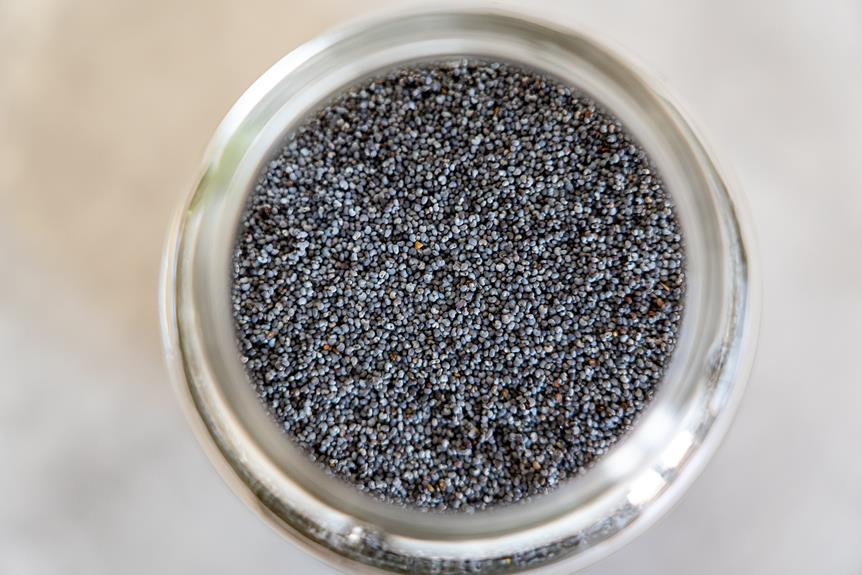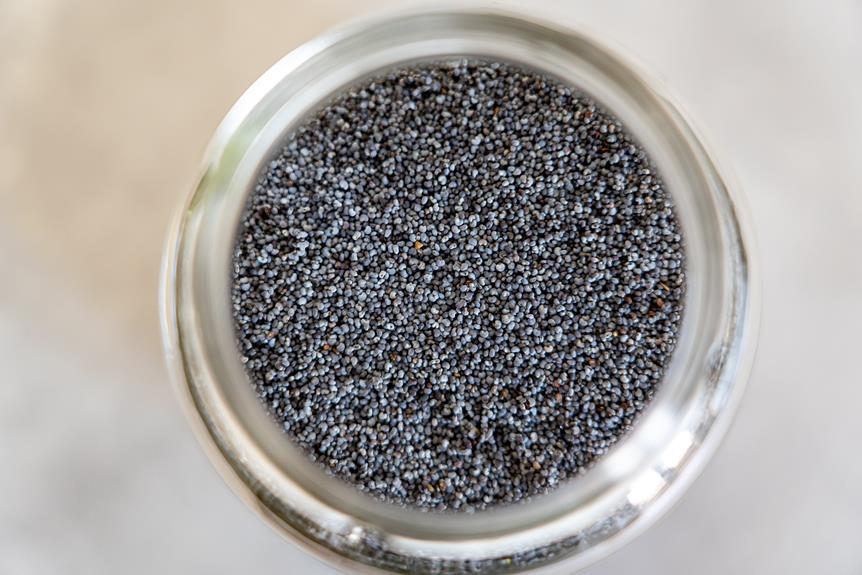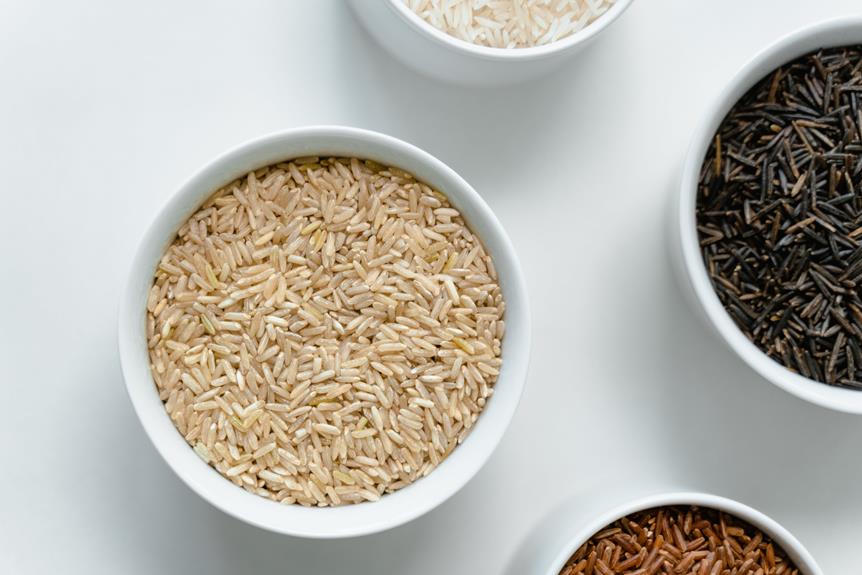Looking to transform your digestive health? Look no further than these seven high-fiber foods that will revolutionize the way your body functions. From whole grains to fruits and vegetables, these fiber-rich options will leave you feeling satisfied and your digestive system running like a well-oiled machine. But wait, there's more! Stay tuned to discover the surprising benefits of adding nuts and seeds, as well as bran and bran cereals, to your diet. Your gut will thank you for it.
Key Takeaways
- Whole grains, legumes, fruits, vegetables, nuts, and seeds are high-fiber foods that promote digestive health.
- High-fiber seeds like almonds, chia seeds, flaxseeds, and walnuts provide essential nutrients and support weight management.
- Fiber-rich bran and bran cereals regulate bowel movements and improve heart health by lowering cholesterol levels.
- Hydration, regular physical activity, and managing stress are additional tips for maintaining good digestive health.
Whole Grains
To improve your digestive health, incorporate whole grains into your diet. Whole grains are an excellent source of fiber, which plays a crucial role in maintaining a healthy digestive system. Fiber adds bulk to your stool, making it easier to pass through your intestines and preventing constipation. It also helps regulate your bowel movements by promoting regularity. Whole grains are rich in vitamins, minerals, and antioxidants that support overall digestive health.
When choosing whole grains, opt for varieties that haven't been overly processed. Look for labels that say "100% whole grain" or "whole wheat" to ensure you're getting the maximum nutritional benefits. Whole grains include foods like whole wheat bread, brown rice, oatmeal, quinoa, and whole grain pasta. These options are not only delicious but also provide a range of nutrients that are beneficial for your digestive system.
Incorporating whole grains into your diet is easier than you might think. Start by swapping out refined grains for whole grain alternatives. For example, choose whole wheat bread instead of white bread, or brown rice instead of white rice. You can also experiment with different whole grain recipes, such as adding quinoa to your salads or using whole grain pasta in your favorite pasta dishes.
Remember to drink plenty of water when increasing your fiber intake, as fiber absorbs water and helps move waste through your digestive system. Gradually increase your fiber intake to prevent any discomfort or bloating. With regular consumption of whole grains, you can support a healthy digestive system and enjoy the benefits of improved overall health.
Legumes
If you're looking to further enhance your digestive health, consider incorporating legumes into your diet. Legumes, such as beans, lentils, and chickpeas, are not only rich in fiber but also packed with essential nutrients that can support your overall well-being.
One of the key benefits of legumes is their high fiber content. Fiber is crucial for maintaining a healthy digestive system as it helps regulate bowel movements and prevents constipation. By adding legumes to your meals, you can increase your fiber intake and promote regularity.
Moreover, legumes are a great source of plant-based protein. If you're following a vegetarian or vegan diet, incorporating legumes can help meet your protein needs. Protein is essential for muscle repair, hormone production, and immune function. By including legumes in your meals, you can ensure you're getting an adequate amount of protein for optimal health.
In addition to fiber and protein, legumes are also rich in vitamins and minerals. They are a good source of iron, magnesium, potassium, and folate. Iron is important for oxygen transport in the body, while magnesium and potassium are essential for maintaining healthy blood pressure and nerve function. Folate, on the other hand, is crucial for cell growth and development.
To incorporate legumes into your diet, you can try adding them to salads, soups, or stews. You can also make delicious dishes like bean burgers, lentil curry, or hummus. Be sure to soak and cook legumes properly to improve their digestibility and reduce the chance of digestive discomfort.
Fruits
Now let's talk about the benefits of including fruits in your diet and some examples of high-fiber fruits. Fruits are not only delicious, but they also provide essential vitamins, minerals, and antioxidants. Some excellent high-fiber options include raspberries, apples, and pears.
Benefits of Fruits
Eating fruits provides numerous health benefits, making them a crucial addition to your diet. Here are some reasons why you should incorporate fruits into your daily routine:
- Rich in vitamins and minerals: Fruits are packed with essential nutrients like vitamin C, potassium, and folate, which are vital for your overall health and well-being.
- High in dietary fiber: Fruits are an excellent source of dietary fiber, which aids in digestion, prevents constipation, and promotes a healthy gut.
- Antioxidant powerhouses: Fruits are loaded with antioxidants that help protect your body against harmful free radicals, reducing the risk of chronic diseases.
- Hydration boosters: Many fruits have high water content, helping to keep you hydrated and maintain optimal bodily functions.
Examples of High-Fiber Fruits
To explore the topic of high-fiber fruits, let's take a look at some delicious and nutritious options that can help support your digestive health. One excellent choice is raspberries. With a whopping 8 grams of fiber per cup, they are a sweet and tangy addition to your diet. Another great option is apples. A medium-sized apple contains about 4 grams of fiber and is packed with vitamins and antioxidants. If you're looking for a tropical twist, try adding some sliced mango to your diet. One cup of mango provides about 3 grams of fiber, along with a burst of natural sweetness. Lastly, don't forget about pears. With their juicy texture and 5 grams of fiber per medium-sized fruit, pears are a fantastic choice for promoting digestive health. Incorporating these high-fiber fruits into your diet can provide a tasty and beneficial boost to your digestive system.
Vegetables
Now, let's talk about vegetables. These nutrient-packed greens provide a colorful variety that is essential for your digestive health. From leafy greens like spinach and kale to vibrant veggies like peppers and carrots, incorporating a wide range of vegetables into your diet will ensure that you are getting the fiber and nutrients your digestive system needs.
Nutrient-Packed Greens
Including nutrient-packed greens in your diet is essential for maintaining good digestive health. These vibrant vegetables are not only delicious but also packed with essential nutrients that can support your digestive system. Here are four nutrient-packed greens that you should consider adding to your diet:
- Spinach: Rich in fiber and antioxidants, spinach can help promote healthy digestion and prevent constipation.
- Kale: Loaded with vitamins A, C, and K, kale can aid in digestion and support a healthy gut.
- Broccoli: This cruciferous vegetable is high in fiber and contains compounds that can support digestive health.
- Swiss chard: With its high fiber content, Swiss chard can help regulate bowel movements and promote a healthy digestive system.
Colorful Veggie Variety
Consider incorporating a variety of colorful vegetables into your diet to further support your digestive health. Vegetables are not only packed with essential nutrients, but they also provide a significant amount of dietary fiber that promotes proper digestion. Including a wide range of colorful veggies in your meals can ensure that you receive a diverse array of vitamins, minerals, and antioxidants that are beneficial for your overall well-being. To help you visualize the variety of colorful vegetables you can choose from, here's a table showcasing some options:
| Red Vegetables | Green Vegetables |
|---|---|
| Tomatoes | Broccoli |
| Red bell peppers | Spinach |
| Beets | Kale |
| Orange Vegetables | Purple Vegetables |
| Carrots | Eggplant |
| Sweet potatoes | Purple cabbage |
| Butternut squash | Purple potatoes |
Nuts and Seeds
You can incorporate nuts and seeds into your diet to promote digestive health. Including these nutrient-packed foods in your meals not only adds a delicious crunch but also provides numerous benefits for your digestive system. Here are four reasons why nuts and seeds should be a part of your high-fiber diet:
- Rich in fiber: Nuts and seeds, such as almonds, chia seeds, flaxseeds, and walnuts, are excellent sources of dietary fiber. Fiber plays a crucial role in regulating bowel movements and preventing constipation. It helps to bulk up the stool, making it easier to pass through the digestive tract.
- Promote gut health: Nuts and seeds contain prebiotic fibers that act as food for the good bacteria in your gut. These bacteria help maintain a healthy balance in your digestive system, improving overall gut health and reducing the risk of digestive disorders.
- Provide essential nutrients: Nuts and seeds are packed with essential nutrients like vitamins, minerals, and antioxidants. These nutrients support the overall health of your digestive system and help protect against inflammation and oxidative stress.
- Support weight management: Incorporating nuts and seeds into your diet can also help with weight management. Despite being calorie-dense, they are satiating and can help control hunger cravings, leading to reduced calorie intake and improved weight management.
Bran and Bran Cereals
Bran and bran cereals are another excellent addition to your high-fiber diet for digestive health. They are rich in fiber and can provide numerous benefits to your digestive system. Bran is the outer layer of grains, such as rice, wheat, and oats, that is usually removed during the refining process. However, this outer layer contains a significant amount of fiber, making it a valuable addition to your diet.
Including bran and bran cereals in your meals can help regulate bowel movements and prevent constipation. The fiber in bran adds bulk to your stool, making it easier to pass through your digestive system. This can help alleviate discomfort and promote regularity.
In addition to promoting regular bowel movements, bran and bran cereals can also help lower cholesterol levels. The soluble fiber in bran binds to cholesterol in the digestive tract, preventing it from being absorbed into the bloodstream. By reducing cholesterol absorption, bran can help lower your overall cholesterol levels and improve heart health.
To help you understand the fiber content of different bran cereals, here is a table showcasing the fiber content per serving of some popular brands:
| Bran Cereal | Fiber Content per Serving |
|---|---|
| Brand A | 10 grams |
| Brand B | 8 grams |
| Brand C | 6 grams |
| Brand D | 5 grams |
| Brand E | 4 grams |
Frequently Asked Questions
Can High-Fiber Foods Cause Any Digestive Issues?
High-fiber foods, in general, do not cause digestive issues. In fact, they can actually improve your digestive health. However, if you suddenly increase your fiber intake without giving your body time to adjust, you may experience some temporary discomfort such as bloating or gas. It is recommended to gradually increase your fiber intake and drink plenty of water to help prevent any potential digestive issues. Overall, high-fiber foods are beneficial for optimal digestive health.
How Much Fiber Should I Consume Daily for Optimal Digestive Health?
To achieve optimal digestive health, you should aim to consume the recommended daily amount of fiber. The exact amount varies depending on your age and gender. On average, adult men should consume about 38 grams of fiber per day, while adult women should aim for around 25 grams. Increasing your fiber intake can help promote regular bowel movements and prevent constipation. Incorporating high-fiber foods into your diet, such as fruits, vegetables, whole grains, and legumes, can help you reach your daily fiber goals.
Are There Any High-Fiber Foods That Are Not Suitable for Individuals With Certain Dietary Restrictions, Such as Gluten Intolerance or Nut Allergies?
Are there any high-fiber foods that aren't suitable for you if you have certain dietary restrictions, like gluten intolerance or nut allergies? It's important to be mindful of your dietary restrictions when choosing high-fiber foods. Some high-fiber foods, such as whole wheat products, may contain gluten and may not be suitable for those with gluten intolerance. Similarly, nuts, which are high in fiber, can be problematic for individuals with nut allergies. It's always best to consult with a healthcare professional or nutritionist to determine the best high-fiber options for your specific dietary needs.
Can High-Fiber Foods Help With Weight Loss?
High-fiber foods can indeed help with weight loss. When you consume foods that are high in fiber, such as fruits, vegetables, whole grains, and legumes, you tend to feel fuller for longer periods of time. This can help you eat less and reduce overall calorie intake, which is essential for weight loss. Additionally, high-fiber foods can promote healthy digestion and prevent constipation, which can also contribute to weight management.
Is It Possible to Get Enough Fiber From Supplements Instead of Whole Foods?
Yes, it is possible to get enough fiber from supplements instead of whole foods. However, it is generally recommended to obtain fiber from whole foods as they provide other essential nutrients. Supplements can be a convenient option, but they should not replace a balanced diet. Whole foods like fruits, vegetables, whole grains, and legumes are great sources of fiber that promote optimal digestive health. Incorporating these foods into your diet can help ensure you meet your fiber needs.




